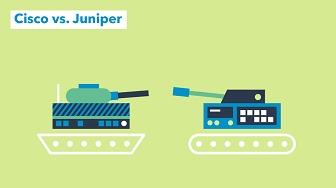Networking Battles: Cisco vs. Juniper
Ultimately, the best way to decide which company is right for you is to evaluate your specific needs and requirements

Everyone loves a good underdog story. Luke Skywalker and the scrappy Rebellion defeating the tyrannical Empire's Death Star. Frodo and Sam scaling Mount Doom to end the dark lord Sauron. William Wallace leading his kinsmen into battle against the authoritarian English. Against all odds, our heroes are victorious over the insurmountable forces that hold dominance over the galaxy/Middle Eeast/New Jersey.
This isn't one of those stories.
Networking giant Cisco isn't evil but they do hold dominance over market share and data centers worldwide. Who wouldn't want an underdog to rise up and dethrone them? Easier said than done, though.
The underdog in our story, Juniper, has made great strides with their product line, but that just might not be enough. There are plenty of reasons to stick with a company as large and ubiquitous as Cisco for your IT needs. We explore these needs and what standardization means for you and your data center.
Juniper: Part of the Router Alliance and a Traitor
Juniper, founded in 1996 to manufacture internet-optimized routers, quickly raised venture capital before a record-setting IPO in 1999. Continuing growth into the 2000s, their product line focused on high-end routers, including core routers for very large LANs and edge routers sitting between ISPs and their customers.
During this time, they very publicly called out Cisco, claiming a superior product. Both vendors then made overzealous marketing claims in the heated public battle.
By the mid-2000s, Juniper had firmly carved out a niche in the ISP hardware market but wanted to move more into the enterprise sector. Through some key partnerships and acquisitions, Juniper started rolling out lines of switches, firewalls, and wireless hardware.
They eventually gave up on wireless, but currently maintain a robust line of routers, switches, firewalls, and software-defined networking products. While these core network offerings continue to serve them well, it might not be enough to topple the Empire.
Cisco: Galactic Empires also Need Good Wi-Fi
Cisco's history stretches back farther to 1984 with their first router. Today, the company's offerings are ubiquitous, basically covering any device with a network jack short of a computer. Routers, switches, firewalls, wireless, video conferencing, phones, cable modems, security cameras, storage networking, and even servers and racks; they literally are a player in every area of your infrastructure.
And guess what, admin pro? You're in charge of all of them.
So maybe you like Juniper switches or they are more cost effective, but you also need new phones and wireless for all your offices, which Juniper doesn't offer.
Do you really want to learn two or more command line syntaxes? Keep up with two or more account reps, sets of certifications to earn, or portals for support, firmware, and warranty renewals?Or do you want to standardize on one manufacturer for all your infrastructure needs? Cisco says yes, yes you do, these are the droids (and switches and phones and access points…) you're looking for.
One Vendor to Rule Them All
There are other great reasons to standardize your infrastructure. One is leaning on the collective knowledge of the internet. Cisco, with more history and market share, has more global adoption. Therefore, if you're having a problem, someone else on the internet has probably had the same problem, making Googling your issues that much easier.
Also, it makes finding talent easier. If your team needs a new networking guy, there are more candidates out there with Cisco experience than Juniper experience. Conversely, when it's time to start looking for a new job, Cisco skills will be in higher demand. Searching a popular IT job hunting site resulted in three-to-six times more openings looking for Cisco experience, depending on the area.
Choose your side
So, you decided to join the dark side. Maybe it's your first time touching any Cisco kit, maybe you can program a router blindfolded, either way, there's always more to learn and CBT Nuggets has you covered with our Cisco training. From the intro Padawan-level CCENT Cisco certification all the way up to the Jedi Master CCIE, there's ton of learning to do, starting with the standard routing and switching track and moving into niches like wireless or security.
So which company is better?
The answer to this question depends on your specific needs. If you're looking for a wide range of products and services, then Cisco is a good option. If you're looking for high-performance, scalable networking solutions, then Juniper is a good option.